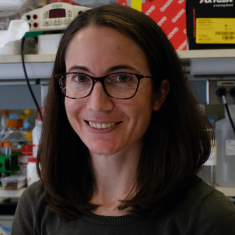
Lisa D. Boxer, Ph.D.
- Center for Cancer Research
- National Cancer Institute
- Building 37, Room 1122A
- Bethesda, MD 20892
- 240-760-7455
- lisa.boxer@nih.gov
RESEARCH SUMMARY
The Boxer lab studies the role of chromatin regulation in neural development and how mutations in chromatin regulators lead to neurodevelopmental disorders and cancer. Current projects in the lab focus on specific types of DNA methylation found in neurons and the proteins associated with these modifications.
Areas of Expertise

Lisa D. Boxer, Ph.D.
Research
Mutations in chromatin regulators underlie many neurodevelopmental disorders. The importance of chromatin regulators may relate to a unique challenge that neurons face among cell types: neurons must maintain genome integrity without cell division for an organism’s full life span while simultaneously allowing enough genome plasticity for learning and memory. We are studying how neuron-specific chromatin features enable neuronal function and how mutations in chromatin regulators lead to neurological disease.
From L to R: Lisa Boxer, Tyler Masuda, Shiran Su, Rosy Sakr and Maya Larbi
For example, we study the specific types of DNA methylation found in neurons. In most differentiated cell types, DNA methylation occurs primarily in the CG sequence, but during postnatal brain development neurons accumulate high levels of DNA methylation in the CA sequence, as well as hydroxymethylation in the CG sequence. Mutations in the known writers, readers, and erasers of these modifications are implicated in neurodevelopmental disorders and cancer, but the function of these modifications is not fully understood. We are investigating why these specific types of DNA methylation accumulate in neurons, how they regulate transcription and genome integrity, and how mutations in regulators of DNA methylation lead to neurodevelopmental disorders and cancer.
One regulator of DNA methylation we study is MeCP2, a neuronally-enriched protein that binds to methylated DNA in both the CG and CA sequence. Mutations in MeCP2 cause the neurodevelopmental disorder Rett syndrome. The function of MeCP2 has puzzled researchers for years because the severe disease symptoms that result from its mutation are accompanied by only subtle changes in gene expression. To investigate the function of MeCP2, we have developed a mouse line in which the MeCP2 protein can be rapidly degraded in the brain. We are using this system to distinguish the immediate molecular consequences of acute MeCP2 loss from the secondary consequences of long-term neurological impairment. These experiments will enable better understanding of MeCP2 and DNA methylation in the brain, and this approach can be broadly applied to other chromatin regulators implicated in neurological disease.
Publications
- Bibliography Link
- View Dr. Boxer's Complete Bibliography at NCBI.
Activity-induced MeCP2 phosphorylation regulates retinogeniculate synapse refinement
MeCP2 represses the rate of transcriptional initiation of highly methylated long genes
Characterization of human mosaic Rett syndrome brain tissue by single-nucleus RNA sequencing
Early-life gene expression in neurons modulates lasting epigenetic states
ZNF750 interacts with KLF4 and RCOR1, KDM1A, and CTBP1/2 chromatin regulators to repress epidermal progenitor genes and induce differentiation genes
Biography

Lisa D. Boxer, Ph.D.
Dr. Lisa Boxer received her Ph.D. in Biology from Stanford University in 2015. Her thesis research in Dr. Paul Khavari’s lab focused on transcriptional regulation of epidermal differentiation. For her postdoctoral research, she joined Dr. Michael Greenberg’s lab at Harvard Medical School. Her postdoctoral work focused on neuronal gene regulation by the methyl-DNA-binding protein MeCP2, mutations in which cause the neurodevelopmental disorder Rett syndrome. Dr. Boxer’s research has been recognized with multiple fellowships and awards, including an NSF Graduate Research Fellowship, an NIH F32 Postdoctoral Fellowship, and an NIH K99/R00 Pathway to Independence Award. Dr. Boxer joined the Laboratory of Genome Integrity, NCI, as a Stadtman Investigator in January 2022.
Job Vacancies
| Position | Degree Required | Contact Name | Contact Email |
|---|---|---|---|
| Postdoctoral Fellow - Neuronal development and disorders, chromatin regulation | Ph.D. or equivalent | Lisa Boxer | lisa.boxer@nih.gov |
News
Learn more about CCR research advances, new discoveries and more
on our news section.



